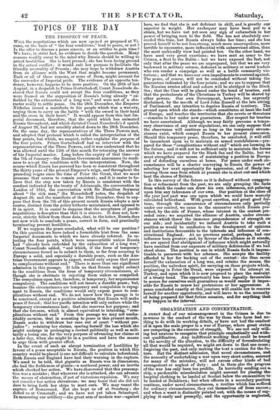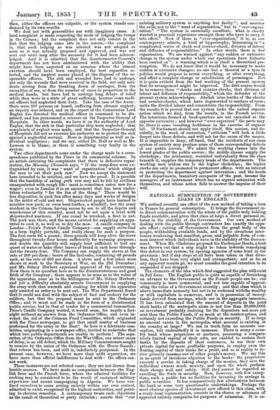ORGANIZATION AND CONCENTRATION.
GREAT deal of our mismanagement in the Crimea is due to, newness in the conduct of the war by those whir have had no- thing to do with its working clbtalls, or have not had the conduct of it.upon. the scale proper to a war of Europe, where great states are competing in. the-exencise of strength. We are not only will- ing but anxious to' recognize that principle emphatically and with- out qualification. Any indifferent working that could be traced to the novelty of the situation, to the difficulty of forecalculating all that would' be required; we might aet down to that one cause ;. forgiving the past, and only making the text a caution for the fu- ture. But the distinct admission, that novel circumstances, and, the necessity of undertaking 'a war upon very short notice, account for many of the mistakes, will not excuse other kinds of bad arrangement or neglect of duty : and in them also the progress of the war has only been too prolific. In hurriedly sending out a. ship, a pardonable miscalculation might account for placing the hospital clothing to be landed at Scutari below the ammunition to. be landed at Balaklava; but when officers in a secondary position continue,.under novel circumstances, a routine which-has sufficed for ordinary circumstances, they cut themselves off from excuse ; and' when a want is distinctly pointed out,, with the means of sup- plying it easily and promptly, and the opportunity ie neglected,
then, either the officers are culpable, or the system stands con- demned by its own results. We deal not with generalities nor with imaginary cases. A, loud complaint is made respecting the mode of lodging the troops in the Crimea ; but the complaint does not only consist in the fact that the lodging came late in the season,—the complaint is, that such lodging as was selected was not adopted so soon as it was actually proposed and approved, and was not sent out until long after the necessity for it had been acknow- ledged. And it is admitted that the Quartermaster-General's department has not been administered with the ability that might have been expected on an occasion where the utmost exertion should have been employed, the best capacities se- lected, and the amplest means placed at the disposal of the re- sponsible officers The sick and wounded have had to undergo, not only the wounds that were received in the field, not only acci- dents arising from the breaking down of carriages, from the casualties of sea or from the number of cases in proportion to the medical hands, but have had to undergo long delays of relief while they were in a state of great suffering, because some medi- cal officers had neglected their duty. Take the case of the Avon : there were 297 persons on board, suffering from chronic neglect; an inquiry was ordered, and on the report of the Commission Lord Raglan has directed the medical officer in command to be dis- missed, and has pronounced a censure on the Inspector-General of Hospitals. In other words, we have it on the authority of Lord Raglan, that the sick in that particular ship were neglected ; that complaints of neglect were made, and that the Inspector-General of Hospitals did not so exercise his authority as to protect the sick a.)-ainst a neglectful servant. Here is departmental as well as in- dividual negligence ; and we say, either Dr. Hall as well as Mr. Lawson is to blame, or there is something very faulty in the system.
Two other departments come under the charge made in a corre- spondence published by the Times in its commercial column. In an article satirizing the complaints that there is defective organ- ization, the Morning Chronicle says, "If the camp-fires-were ex- . tinguished by rain, it was 'want of organization' which obliged the men- to eat their pork raw." Now we accept the statement here intended to be satirical, and we have the proof. It is possible that the hardship of eating' pork raw may not be felt by civilians unacquainted with rough life : meat is sometimes eaten raw-for a wager-; even in London it is an amusement that has been under- -Luken voluntarily "for the fun of the thing." There would be less disposition to such fan after many days and weeks of fatigue it the midst of cold and wet. Shipwrecked people have learned to consider raw pork; or- even boot-leather, a windfall; but the army resident in the Crimea, having access by sea to all the depots and warehouses of this country, must not be set upon a level with shipwrecked mariners. If one vessel be wrecked, a fleet is not The pork was there, and the means existed for supplying an appa- ratus to cook it, as well as to dry the men. A candle company in London—Price's Patent Candle Company—can supply stove-fuel in a form highly portable, and really cheap for such a purpose. The-fuel costs 8d. a pound ; three pounds will keep alive the stove throughout twenty-four hours sufficiently for warming purposes ; and double the quantity will supply heat sufficient to boil one quart of water or bake three loaves of bread in each hour through- crutthe twenty-four. The Company can supply the stoves at the ' rate of 200 per diem ; boxes of the fuel-cake, containing48- pounds each, at the rate of 400 per diem. A stove and a few cakes were shown at work to the Secretary at War, on the 23d December; and Mr. Sidney Herbert expressed approval of the contrivance. Now-there is no question here as to the disinterestedness and good faith of 'the Company; there appears to be none as to the value of the apparatus, none as to the willingness of Mr. Sidney Herbert;- and and yet a difficulty absolhtely arrests Government in supplying- the-army with that warmth and cooking for which the apparatus only awaited-an order-to be sent out. The War Department found. thatit could:not deal- with the subject of fuel and. cookery for the soldiers, but that the proposal must be sent to the Ordnance Office; and it must not be made in the form of a disinterested public service, but in that of tender for a commercial transaction. Price's Candle Company waited, it would seem, for nearly a fort- night-without an answer from the Ordnance Office, and even hr. yoked the aid- of the Crimean Fund Committee, which originated with the Times newspaper; to get that small matter of business performed for the army in the East! So here is a dilettante com- mittee, originating in a newspaper-office, invited-to undertaker that which two-public departments are unable to perform ! The sepa- ration of the Ordnance Office from. the War Office, one minor cause of delay, is an old defect, which.the Military Commissioners sought to remove by the union of the Ordnance with the Horse Guards : that reform has been, and still is, indefinitely postponed. In the present case, however, we have more than unfit separation, we- have more than official indifference to deal with :- the offices can- not work These instances are not selected cases; they are not drawn from hostile sources. We have made no comparison between the Eng-- lick force and the French force, where the admired facilities for cooking may be considered to be the result of sustained' military' experience and recent campaigning in Algeria. We have con- fined ourselves to cases arising, entirely within our own control, admitted' to exist, recognized by the highest authorities, and point- ing to obvious remedies. A contemporary treats such objections as the result of theoretical or party criticism; asserts that "-our existing military system is anything but faulty"; and ascribes the e s, not to the "want of organization," but to " over-organi- zation." "The system is essentially excellent; what is chiefly wanted is practical experience amongst those who have to carry it into effect" Now if there is "over-organization," it is, as our contemporary admits, a kind of hypertrophy, blossoming "a complicated series of cheek and counter-check, division of labour and diffusion of responsibilities." In other words, there is bad organization. We are warned against "any, sudden or extensive change in the system under which our operations have hitherto been carried on " : a. warning which is in itself a theoretical pre- sumption. We do not know that it would be necessary to make sudden or extensive changes ;-no-one but a theorist or a. tyro in politics would propose to arrest everything, or alter everything, and effect a complete change or substitution of personages. But it is quite evident from the bad working of the present system that its arrangement might be improved. The first course would be to remove those "checks and counter-checks, that division of labour and diffusion of responsibility," which the defender of the present system acknowledges. Abolish nine-tenths of the checks and counter-checks, which have degenerated to,matters of form; unite the divided labour and, concentrate the responsibility. From the results it is proved that our system lacks the united organic action which we find, from the results, in the French_ service. The intentions formed at headquarters are not executed at the opposite extremity ; and however "over-organized" the parts may be, there is some resulting feebleness in. the exercise of organic life. If Parliament should not apply itself, this session, and de- cidedly, to the work of correction, " criticism " will look a little deeper into those defects, and will ask for the cause of the causes. It is impossible to deny, off-hand, that the incidents of our class system of society may produce some of those corresponding defects in our public service. We admit the working classes into the lowest grades of the public service; the middle classes supply the clerkships; the aristocracy, recruited individually from the class beneath it, supplies the temporary heads of the departments: The working- men seldom rise to the higher clerkships ; the higher clerks can only be promoted to-permanent offices, with an interest in protecting the department against/ innovation ; and the heads. of the departments, transitory occupants ofsttie post, become the managers of an instrument which. has no.arganice oonnexion with themselves, and whose action fails to answer-the impulse-of their will:































 Previous page
Previous page